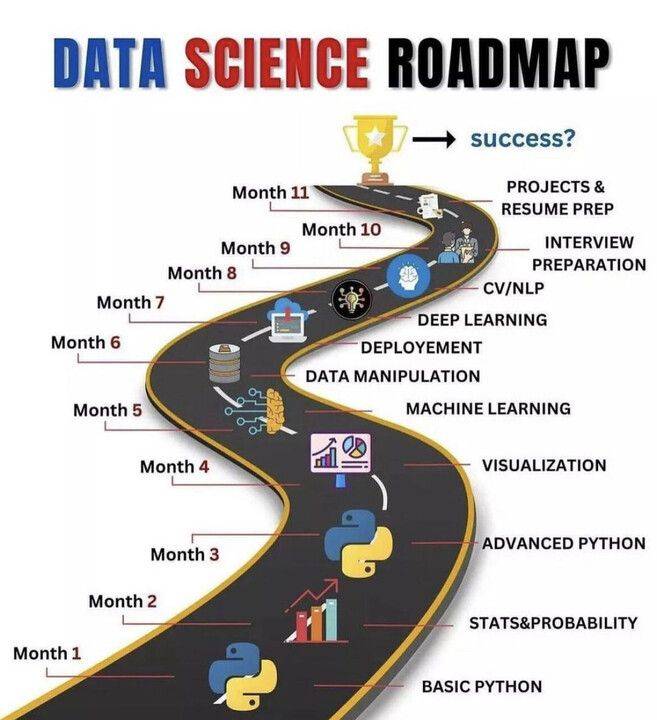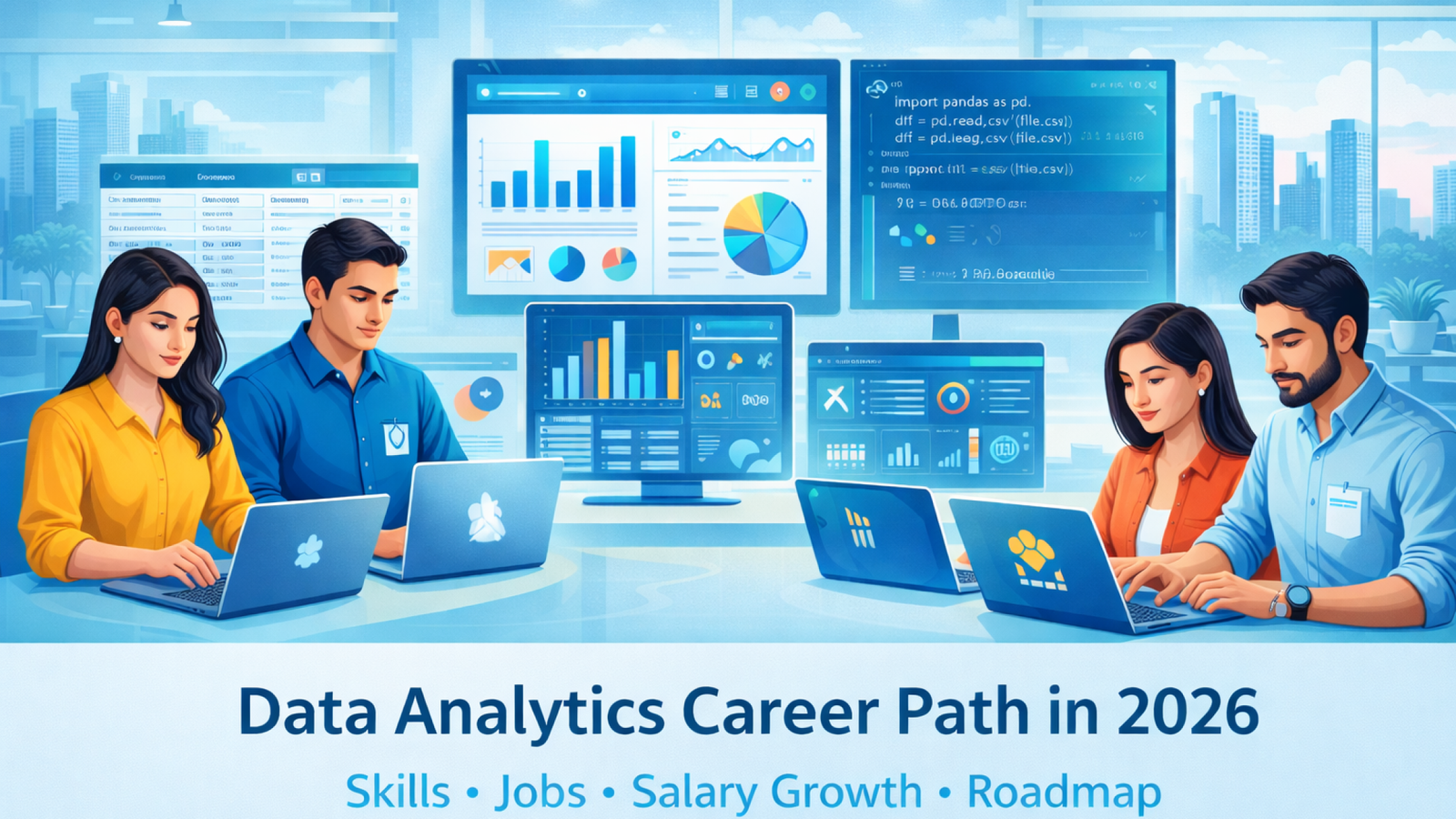How to Become a Data Scientist: Skills, Salary, and Career Roadmap (2025)

Introduction
How to become a data scientist is one of the most asked questions in today’s digital era. With the explosive growth of artificial intelligence, machine learning, and big data, the role of a data scientist has become one of the most rewarding and future-proof career choices in 2025 and beyond. Every industry from healthcare and finance to e-commerce and IT now relies on data scientists to analyze massive amounts of information and provide insights that drive smarter decisions.
Who is a Data Scientist?
A Data Scientist is a professional who extracts insights from large and complex datasets using statistics, programming, and machine learning. Unlike traditional analysts, data scientists combine programming, mathematics, business knowledge, and communication to solve real-world problems.
For example:
In e-commerce, they build recommendation engines (like Amazon and Flipkart).
In healthcare, they analyze patient data to predict diseases and improve treatments.
In finance, they use predictive models for fraud detection and risk analysis.
In short, a data scientist turns raw data into actionable insights that help organizations grow and innovate.
Why Choose a Career in Data Science in 2025?
High Demand – LinkedIn listed Data Science among the fastest-growing careers in 2025.
Excellent Salary – Average salaries for data scientists in India range from ₹6–25 LPA, while in the US, it can cross $120,000 per year.
Versatility – Data science jobs exist in IT, healthcare, fintech, retail, sports, and even government policy.
Future-Proof Career – With the rise of AI & automation, data science will remain one of the most secure career paths.
Global Opportunities – Skilled data scientists can easily transition into global roles in top MNCs.
Skills Required to Become a Data Scientist
To master how to become a data scientist, you’ll need both technical and soft skills:
Technical Skills
Programming Languages: Python, R, SQL, and sometimes Java or Scala.
Statistics & Mathematics: Probability, linear algebra, regression analysis.
Data Manipulation: Pandas, NumPy, Excel.
Machine Learning & AI: Scikit-learn, TensorFlow, PyTorch.
Data Visualization: Power BI, Tableau, Matplotlib, Seaborn.
Big Data Tools: Hadoop, Spark, AWS, Google Cloud, Azure.
Soft Skills
Problem-Solving: Ability to break down complex issues.
Critical Thinking: Making sense of patterns in messy data.
Business Acumen: Understanding industry-specific challenges.
Communication: Explaining technical insights to non-technical teams.
Step-by-Step Roadmap: How to Become a Data Scientist
If you’re serious about learning  , you need a clear roadmap that takes you from beginner to job-ready professional. Here’s a detailed, actionable plan:
, you need a clear roadmap that takes you from beginner to job-ready professional. Here’s a detailed, actionable plan:
Build a Strong Educational Foundation
A bachelor’s degree in Computer Science, IT, Statistics, or Mathematics is the most common entry point.
But don’t worry if you’re from a non-technical background — you can still become a data scientist through certifications and online courses.
Focus on subjects like:
Linear Algebra
Probability & Statistics
Data Structures & Algorithms
Learn Core Programming Languages
Data science is programming-heavy. Begin with:
Python → Most popular for data science (libraries: Pandas, NumPy, Scikit-learn).
R → Great for statistical analysis and research.
SQL → Essential for querying and managing databases.
Master Statistics & Mathematics for Data Science
Without statistics, data science is incomplete. Focus on:
Descriptive & Inferential Statistics
Probability Distributions
Hypothesis Testing
Regression & Correlation
Linear Algebra for Machine Learning
Learn Data Wrangling & Preprocessing
Real-world data is messy. Learn how to:
Clean, format, and handle missing values.
Use Python libraries (Pandas, NumPy) for preprocessing.
Work with Excel & Google Sheets for initial exploration.
Explore Data Visualization Tools
Communicating insights visually is crucial. Learn:
Python Libraries: Matplotlib, Seaborn
BI Tools: Tableau, Power BI
Dashboards: Google Data Studio
Dive into Machine Learning (ML) & AI
Machine learning is at the heart of data science. Cover:
Supervised Learning: Regression, Classification
Unsupervised Learning: Clustering, Dimensionality Reduction
Deep Learning: Neural Networks, CNNs, RNNs (with TensorFlow & PyTorch)
Reinforcement Learning (for advanced learners)
Work with Big Data & Cloud Platforms
Companies often handle massive datasets. Learn:
Big Data Tools: Hadoop, Spark
Cloud Platforms: AWS, Azure, Google Cloud
Data Pipelines: Airflow, Kafka
Gain Hands-On Experience with Projects
Practical projects make you job-ready. Examples:
Predicting housing prices using regression.
Customer segmentation with clustering.
Fraud detection using classification.
Sentiment analysis on Twitter data.
Build a Strong Portfolio & Resume
Your portfolio is proof of your skills. Include:
GitHub repositories with projects.
Kaggle competition rankings.
Case studies with real datasets.
Dashboards & visualizations.
Prepare for Data Science Interviews
Most companies test both technical and problem-solving skills. Focus on:
Coding Rounds: Python, SQL challenges.
ML & Statistics Questions: Regression, clustering, probability.
Business Case Studies: Real-world problem-solving.
Behavioral Interviews: Communication & teamwork.
Get Certified & Network with Professionals
Certifications strengthen your resume. Top options:
Google Data Analytics Certificate
IBM Data Science Professional Certificate (Coursera)
Microsoft Certified: Data Scientist Associate
Cambridge Infotech Data Science Program
Also, network actively on LinkedIn, attend data science meetups, and join communities like Kaggle, Towards Data Science (Medium), and Reddit’s r/datascience.
Apply for Jobs & Keep Learning
Start with Internships, Research Assistant roles, or Junior Data Analyst positions.
Transition into full-time Data Scientist roles once you have experience.
Stay updated with new tools (like AutoML, Generative AI, LLMs).
Data Scientist Salary Trends in 2025
| Location | Average Salary (Entry Level) | Experienced Salary |
|---|---|---|
| India | ₹6–12 LPA | ₹20–35 LPA |
| USA | $85,000–$110,000 | $120,000–$160,000 |
| UK | £40,000–£55,000 | £70,000–£100,000 |
| Middle East | AED 180,000–250,000 | AED 300,000+ |
According to Indeed, the average salary for a Data Scientist in the US in 2025 is around $128,000/year.
Career Paths After Becoming a Data Scientist
Once you know how to become a data scientist, you can specialize in different roles:
Machine Learning Engineer
AI Engineer
Big Data Analyst
Business Intelligence Analyst
Data Engineer
Deep Learning Specialist
Challenges in Becoming a Data Scientist
Continuous Learning: New tools & frameworks emerge every year.
High Competition: Many aspirants enter the field, so strong portfolios matter.
Real-World Data Issues: Data is often messy, incomplete, or biased.
Best Resources to Learn Data Science
Courses & Platforms:
Coursera (Data Science Specialization)
edX (MITx Data Science)
Cambridge Infotech – cambridgeinfotech.io
Communities & Competitions:
GitHub Projects
LinkedIn Groups
Books:
Python for Data Analysis by Wes McKinney
Hands-On Machine Learning with Scikit-Learn & TensorFlow by Aurélien Géron
Future of Data Science Careers
The future of data science careers is extremely promising, and this is one of the main reasons so many people are eager to learn how to become a data scientist today. With organizations across the globe generating huge volumes of data every second, the demand for professionals who can analyze, interpret, and apply data-driven insights is only going to rise.
1. Explosive Job Growth
Reports from the U.S. Bureau of Labor Statistics show that data science jobs will grow by more than 35% by 2032, creating thousands of new opportunities. In India, NASSCOM projects that over 1.5 million new roles will be created in analytics and AI by 2026. This growth highlights why it’s essential to understand how to become a data scientist if you want to secure a future-proof career.
2. AI, ML, and Automation Integration
The future of data science will be deeply connected to artificial intelligence, machine learning, and automation. Data scientists won’t just analyze data — they’ll build intelligent systems, train AI models, and ensure ethical use of technology. Anyone exploring how to become a data scientist should prepare to work with tools like TensorFlow, PyTorch, and Generative AI systems.
3. Specialized Roles Emerging
As the field matures, generalist roles are splitting into specialized data careers such as:
Machine Learning Engineer
Big Data Engineer
AI Research Scientist
Business Intelligence Analyst
Deep Learning Specialist
This means the roadmap on how to become a data scientist will soon involve choosing a specialization aligned with your skills and career goals.
4. Cross-Industry Applications
Data science is no longer limited to tech companies. Future applications will span:
Healthcare: Predictive analytics, disease prevention, and personalized treatments.
Finance: Fraud detection, algorithmic trading, risk management.
Retail & E-commerce: Product recommendations, supply chain optimization.
Government: Smart city planning, digital governance, policy-making.
If you are researching how to become a data scientist, these diverse opportunities make the career highly versatile and globally relevant.
5. Salaries and Global Demand
The salary growth in data science will continue to be attractive. Freshers in India who master how to become a data scientist can start at ₹6–12 LPA, while senior professionals can reach ₹25–35 LPA. In the U.S. and Europe, average salaries remain above $120,000 annually, with leadership roles paying much higher.
6. Continuous Learning is the Future
To thrive in the long term, professionals must adapt to emerging trends such as AutoML, Quantum Computing, Generative AI, and Edge AI. This makes continuous learning a core part of how to become a data scientist in the modern era.
7. Continuous Learning & Upskilling Will Be Essential
The only constant in data science is change. Tools, frameworks, and algorithms evolve rapidly. Future-ready data scientists must:
Stay updated with AutoML, Generative AI, Quantum Computing, and Edge AI.
Learn cloud-based data science platforms like AWS SageMaker, Google Vertex AI, and Azure Machine Learning.
Build strong foundations in mathematics, statistics, and computer science while adapting to new trends.
8. The Future in India vs Global Market
India: With its booming IT ecosystem, India is expected to become a global hub for data science talent. Startups, MNCs, and government initiatives (like Digital India & AI for All) are creating huge demand.
Global: The U.S., UK, Canada, Germany, and Singapore continue to lead in hiring, but there’s also rising demand in Middle East, Australia, and Southeast Asia.
FAQs
1. Do I need a degree to become a data scientist?
No, but having a degree in Computer Science, Statistics, or Mathematics helps. You can also switch careers with certifications.
2. How long does it take to become a data scientist?
Typically, 6–12 months of focused learning plus project experience.
3. What is the average salary of a data scientist in India?
Entry-level salaries range between ₹6–12 LPA, while experienced professionals earn up to ₹35 LPA.
4. Is data science good for freshers?
Yes. Many companies hire freshers if they have strong projects and certifications.
5. Which is better: Data Scientist or AI Engineer?
Both are excellent careers. Data Science focuses on insights, while AI Engineers focus on building intelligent systems.
Conclusion
Becoming a data scientist is not just about learning programming or statistics — it’s about combining technical expertise, analytical thinking, and business understanding to solve real-world challenges. If you’ve been asking yourself how to become a data scientist, the answer lies in building strong foundations, gaining hands-on experience with projects, and continuously upgrading your skills in AI, machine learning, and big data tools.
Call to Action
Take the Next Step Toward Your Data Science Career
You’ve learned the roadmap of how to become a data scientist — now it’s time to put your career plan into action. Don’t let opportunities pass by while the demand for skilled data scientists is skyrocketing.
With Cambridge Infotech’s Data Science Course, you’ll get:
Expert-led training with real-world projects
Hands-on practice with Python, ML, AI, and Big Data tools
Career support: Resume building, interview preparation & placement guidance
Flexible learning for students, freshers, and professionals
Start your journey today and become industry-ready!
Enroll Now at Cambridge Infotech Book a Free Demo Class
Call us now at – 099024 61116
Visit our Website: cambridgeinfotech.io/
Check Out Related Blogs
How to Build a Career in Ethical Hacking – Become a Certified Ethical Hacker
How to Become a Cloud Security Engineer Career Growth, Demand & Salary Insights
AWS Certification Course for Career Growth – Master Cloud Skills with Cambridge Infotech






